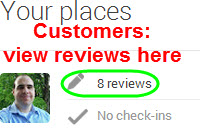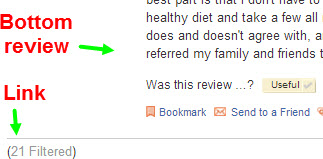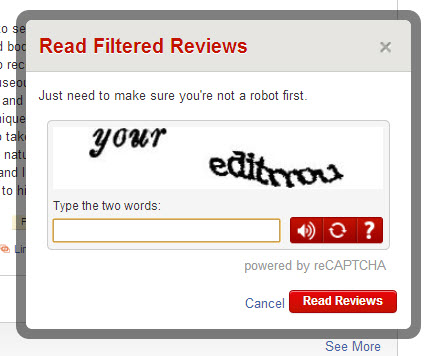There is an afterlife.
If it sounds like I’m saying that with too much confidence, it’s because I’m not talking about people.
I’m talking about reviews – specifically on Google Plus and Yelp, the two sites where it’s most important but hardest for most “local” business owners to get reviews.
What’s the big difference between those two ultra-important sites and others? It’s that reviews don’t simply travel from the typing fingers of your customers, to your business listing, to the eyes of potential new customers.
Somewhere along the way, they can disappear because of Google’s or Yelp’s infamous review filters.
It’s possible for a review not to show up even when you know for a fact that a customer wrote one, and it’s possible for it to show up for a while but later disappear. You name it, it can happen.
What happens to a review once the anti-spam filter mafia works it over? Does it swim with the fishes? Is it gagged and tied to a chair in a dingy basement, held captive until you meet certain demands? Will it be freed? What can you or others do to free it?
I’ve got some thoughts on those points, and so do Mike Blumenthal and Darren Shaw.

Those two guys were kind enough to share some excellent insights (as you’ll see).
Afterlife: Filtered Google Plus Reviews
![]()
You know some of your reviews have been filtered if your customers are the only ones who can see their reviews on your page.
Let’s say you asked Bob, a customer, for a review. You know for a fact he went to the right listing, signed into his Google Plus account, and wrote you a review. If he’s the only one who sees the review on your business page – if nobody else can see Bob’s review – then you know it’s been filtered.
If Bob signs out of his Google account, even he won’t see it on your page any longer. Bob is in a séance with the ghost of the review, made possible by the hocus pocus that is Google Plus.
Where is the filtered review floating around? Mike Blumenthal has some insight on that:
Google has not been totally transparent about their review filtering. In other words they have been totally opaque about the rules and technologies that they are using.
Reviews are kept in a separate index and not with the basic business data. This allows them to remove or move individual reviews. In the past there were also issues where some reviews were lost, misplaced or otherwise missing that didn’t involve their filter. So sometimes it was difficult to know whether they had just “misplaced” a review or had “misjudged” it.
I think most of those problems have been put behind them so at this point if they are not showing up (but do show under the author) then they are being filtered by the filtering algo.
Assuming that a review is visible under the author then if it were ever to be unfiltered by a human at Google. Google can now also move reviews from one business listing to another. These both mean that Google has obviously developed internal tools to allow support staff to this which they never had before.
[Links added by me, not by Mike.]
It’s possible for the review to come back. It may return to your page – exactly where you and your customer wanted it to go – if Google relaxes its filtering algorithm. This happened in January of 2013, after about 7 months of draconian filters that sent far too many innocent reviews to the gallows. It was a great feeling to see many of my clients’ legitimate and hard-earned reviews reappear on their Google listings.
But is there anything you or your customer can do to resurrect your reviews? I’ve never seen it done, and it doesn’t sound as though Mike thinks it’s doable:
Given that we do not know all of the parameters that cause a review to be filtered we don’t really know and can’t easily test if any given review can be unfiltered in some way. The review filter, unlike Yelp’s, seems more complicated and layered. If that is the case and Google scores multiple attributes of any given review it would seem that it would be unlikely that they could be surfaced by user activities. Possible but unlikely.
So, aside from wait and hope that Google later recognizes that your reviews were legit all along, what can you do? I think all you can do is the following:
Ask your customers to log into their Google accounts, copy the review that they wrote, and email it to you. (They have to log into their Plus accounts, click on the “Home” and then “Local” tabs on the left, then click the link under “Your places.”)

First study the review itself and see if you can discern anything that might have tripped the filter to begin with, and see if you can glean any insights that way.
Then copy and paste a sentence or two of the review text into Google, and see what comes up in the search results. It may be the case that Google accidentally stuck the review onto someone else’s listing, in which case you may be able to get it moved to where it belongs.
Don’t give up. Google reviews are never truly dead, as I’ve noticed, and as Mike explains:
Nothing at Google is ever thrown away. Not a listing, not reviews, not anything.
You can’t really even delete a listing. If Google thinks a listing should be shown that you have “deleted” in the dashboard they will show it. Only by “closing” a listing can you make it inactive.
Reviews are the same. They never go away and the system is always looking for a listing to attach them to.
However now that 1) they can unmerge listings and 2) move reviews around it is possible to get reviews off of one listing and onto another if they are there inappropriately.
Afterlife: Filtered Yelp Reviews
![]()
The “afterlife” of Yelp reviews isn’t nearly as mysterious.
They rest securely in Yelp’s “filtered reviews” section. Like Egyptian mummies, Lenin, or poor cryogenically frozen Ted Williams, they can be seen by humans.
Yelp grants these reviews a little privacy:

Not all visitors are allowed in the mausoleum:

I’ve learned over time that reviews on Yelp get filtered out based on reviewers’ activity – or, more specifically, their inactivity – rather than on what they write. I’ve seen Yelp both filter and allow reviews that are short, long, helpful, lousy, full of keywords, devoid of keywords – you name it. I’ve seen helpful, appropriate reviews get filtered, and I’ve seen raunchy ones go through.
What Yelp seems to look at, above all, is how active a Yelper the reviewer is. If your customer goes onto your listing, gives you 5 stars and a review, leaves, and isn’t already in the habit or doesn’t get in the habit of writing reviews on Yelp regularly, his or her review probably will never see the light of day. The reviews of first-timers are marked for death.
What can you do if your reviews have been filtered? Can you rouse them back to life? Well, it depends on how close you are with your customers. You can’t do it alone. Here’s Darren Shaw’s advice
As far as I know, the key to unfiltering Yelp reviews is to engage the reviewer. Many reviews get filtered because the reviewer created an account, left a review, then didn’t use the site again. Yelp trusts reviews from its active users more than the inactive ones, so “activate” that reviewer. Friend them. Respond to their review. “Like” their review. Send them a message through Yelp. Encourage them to review other businesses on Yelp. With a bit of activity, we’ve seen reviews raise from the dead on Yelp.
One tip I’ve wanted to share is how to find people you know on Yelp. I discovered that this google search can help:
yelp “first_name last_initial.” city_name
(Try it on yourself)
Now imagine you have a database of customers, and you check them all with this search. You could put a little “flag” on their account and have your staff let them know you’re on Yelp the next time they come in.
Reviews on Yelp weave in and out of life. As Darren says, the variable that determines whether they stay on terra firma is how active the user is. Even if a review is unfiltered, it can get filtered again if the reviewer goes inactive for more than about 3 weeks. I’ve personally seen it happen to reviews that I’ve written for businesses I frequent. Yelp reviews can die off and be resurrected more than once. There’s not just one afterlife for them. They can always go “poof” or rematerialize, depending mostly on whether the reviews come someone who’s part of or becoming part of Yelp’s “community.”
—
Pretty much all reviews benefit your business – a little or a lot. Here’s my geeky way of thinking about their value to you:
length of time you’ve had a review X how positive the review is X your local rankings = its value to you
That’s why you need to do what you can to get reviews in the first place, and to do what you can to get them back if they ever go anywhere. Now you have the ability to do both.
Last but not least…thanks to Mike and to Darren for their great insights!
Great post Phil. Love the information from Mike on Google reviews. I wonder if getting the Google user engaged by adding more reviews, +1ing reviews, and getting active on Google+ would unfilter the review. I’d love to test. Just need to find a filtered review from someone that will take the time to help out with the test.
Hey Darren, thanks again! Yeah, I was wondering the same thing about Google+ reviews. That would be a great test.
Great article, but I must admit, I enjoyed reading that “raunchy” Yelp review. The photo of the dog sleeping in the tiny bed was priceless!
Unfortunately, the article confirms what I’ve been telling clients all along – it’s important to get those reviews, but it’s really a crap-shoot on whether or not you’ll actually see them.
That Yelp review was just…wrong. At least nobody can say it’s boring!
I do agree that there’s an element of chance in reviews, but it really comes down to how well the business owner plays his/her cards. Approaching Google and Yelp takes a little extra finesse.
Great post Phil (and Darren and Mike)
If you KNOW a client left a review you can investigate. What if you don’t know a customer left a review because it’s missing, you can’t see it and they didn’t tell you?
Here’s a little tip I use all the time when helping folks in the Google Business forum. Go to Google+ and use the search box at the top. Search for the exact business name that’s on the Place page with nothing added. (If it’s a really generic name or there are lots of similar names it does not work as well.)
Be sure the “Everything” search option is selected. Often you can find reviews this way that are not on the Place page – reviews that got filtered from the G+ Local page.
Then you can either investigate what tripped a filter, or contact the client to make a small edit that will sometimes make it go live OR just copy the dead review and add it to the testimonials page on your site. But if you do that, I’d add it in an image because Google won’t make it live for sure, if she can read the same review elsewhere on the web.
Excellent tip, Linda – thanks! I’ll have to try that out.
OK- this makes sense and I don’t want a client freaking out because they can’t see a review. I work with local clients to expand their reach locally and reviews are something I tell them you don’t get if you don’t ask for from your clients…consistently.
Agreed: there’s no guarantee that if you ask you’ll get reviews, but never asking is the closest thing to a guarantee that you won’t.
Yelp tactic is powerful, it works, and I used it all the time. Now Google being able to move reviews around is a great insight. Now a question, has Yelp been known to move reviews around as well? A client moved his business from one city to another, and instead of updating his address on the original listing, he opened a completely new listing now he has a good chunk of reviews on the new listing but much more on the old. Can Yelp combine the reviews from both listings, in theory it’s the reviews for the same business? Will they be more likely to do it if you subscribe to their advertising?
Great question, Vadim. I’m not sure whether you can request that Yelp reviews be moved, but my gut tells me no (as do my couple minutes of research just now). I’ve never seen it done, either.
Yea I have not found much myself. And my gut has the same feeling. If the client decides to risk it with the other listing and ask for the merge, I will try to remember and update you on the answer.
When I was looking into purchasing a paid campaign from Yelp, they offered to move the reviews from one of our Yelp doctor profile listings over to the practice profile listing if we wanted, so I believe they have the ability to do it.
Interesting. Thanks for the intel, Luke.
I’ve resurrected one of my clients filtered reviews from Yelp by placing them on the home page of her website. I created a testimonial slideshow featuring her 7 filtered reviews. I placed a caption explaining that these were indeed “filtered” by Yelp. Then I used a little “rich snippet” magic scehma markup and her (honest and true) 5 stars shows up nicely right in the search results right next to another listing from the same website showing her “rel=author” profile snippet photo as well (I don’t think you can get two snippets on the same listing though.)
Two listings, Two different types of “rich snippets” I’m loving it! Since I know these reviews to be legitimate and not selectively chosen I do not feel as though I’ve committed any “rich snippet abuse.” It’s not like a grabbed a few written testimonials or comment cards and then assumed a 5 star intent from the reviewer without such sentiment being explicitly stated. Screw Yelp and their over sensitive review algo. I have a sneaking suspicion that bad reviews are much more likely to make it through the filter regardless of Yelper activity.
Nicely done, Andrew!
It’s smart to have a backup plan for those reviews that get filtered, so good going on that, Andrew.
I totally agree that Yelp’s review filter is a PIA, often unfair, and needs serious work. But most business owners really should bother with Yelp – at least to cultivate a little bit of a presence there. Yelp is only one piece of the local-search puzzle, but if there’s any way to make it work for you, I’d say it’s worth it. Again, takes finesse, but it’s all an investment.
And yes, I’ve also noticed that non-5-star reviews seem not to get filtered quite as much.
P.S. I believe you can, in fact, have both types of rich snippets showing up in the same search result: https://localsearchforum.catalystemarketing.com/organic-seo/4604-schema-reviews-authorship.html
Thanks for the great tips for bringing a filtered review back to life. My question is this: What are your thoughts on handling a BAD Yelp review that has been filtered? My client has received 2 very negative, very personal Yelp reviews that we suspect were written by a former employee. (Their dates coincide with events in an employment dispute.) Each is under a new account, is the only review given, and both are currently filtered. If they were not filtered, we could contact Yelp and make a case for them to be removed – but since they are filtered I hesitate to “rock the boat” at all… Any thoughts or experience with something like this?
Hi Cheri,
I think your gut instinct is correct: no point in rocking the boat. In any case, there’s not much you can or should do about bad reviews that the review filter (appropriately) nabbed.
Agreed. Thanks again for the great post, Phil.
Any time, Cheri!
One tip that works really well for Yelp is to create a page with screenshots of filtered reviews that you know are real. I would also explain the Yelp filter (including screenshots of the ‘Filtered Reviews’ link), along with explaining that many people with 1 review will get filtered. In some businesses it’s hard to get reviews, like Criminal Defense Lawyers. People don’t go around recommending a DUI or Criminal Lawyer. Once the matter is resolved the client really wants the issue to go away, not stick with their Yelp account.
Not a bad idea, Nathan. Thanks!
Phil
Here’s my review for your blog.
Phil always over delivers on the content and brings on great guests,would I recommend Phil to my friends ,you bet he is a very sharp local marketer that’s has his finger on the pulse of the local community.
Great job again Phil
Thank you
Pete Kici
Thanks, Pete! That’s way too generous.
Phil,
Very helpful and informative post. The wife and I wondered where and why our Yelp reviews went “bye-bye.” I guess the first time is not always a charm (on Yelp anyway). Shout out and a “Thank you!” to your fellow mediums, Mike and Darren…
P.S. Ditto on Pete Kici’s comment!
Thanks, Steven!
Good post Phil,
I’m a little newer to all this compared to you all, but I’ve learned a lot from your blog, so thanks and keep it coming.
Don’t know much about Google+, but I’ve definitely seen the Yelp afterlife cycle. However, while reviews are obviously very important, I wonder if it’s really worth the effort to try and “engage” Yelpers who’ve had their reviews filtered just to get them unfiltered (I do like Linda’s idea of simply posting an image of the dead reviews on your own site).
I’m thinking that you might get equally good results by pouring that energy into just asking more people for reviews in the first place rather than worrying about reviews that were filtered. Sort of a brute force approach, knowing that a certain percentage will be sifted. After all, I do see some businesses that have a fair number of reviews compared to their competitors, so it’s not impossible to get lots of reviews that stick.
Also, Yelp and Google want more and engagement but it seems to me that this is just their way of getting us to do the work for them, and something about that irks me 🙂
Thanks for your compliments, Tony.
You make some excellent points. In a lot of cases, it certainly isn’t worth “engaging” with the customers whose reviews have been filtered by Yelp. In some cases it’s not even possible, like if you’re not close at all with your customers, and they’d find it weird for you to contact them (although that might be a bigger problem than the filtered reviews). It’s also probably not worth engaging with customers if some of their Yelp reviews do seem to be sticking. In that case I’d agree that the best solution is just to ask more people.
The “engagement” approach is most applicable to people in one of two situations:
(1) All or the vast majority (90% +) of their reviews are getting nabbed by the filters. If there’s a hole in the bottom of your bucket, you try to fix the bucket or stop pouring water (and maybe find a different bucket). Engaging with reviewers may help you patch up the bucket.
(2) They don’t have dozens or hundreds of customers, so a review from one is pretty significant. If the average customer/client/patient is worth a good number of dollars to you and represents a lot of work and time on your part, and if the person has already tried to review you, it’s worth at least trying to get the review out of the dirt.
Hi Phil,
Thank you for this great insight post! I like your site a lot. It’s very usefull 🙂
I noticed another thing about filtered reviews here in Holland. Some reviews were not showed to us (company) but the were visible on the profile pages of visitors. (clients) I notices that some clients uses links (ww. or .nl in there comments). The moment the were removed the post was immediately showed in the reviews… 🙂
I think you already know this, but maybe it helps somebody.
Greetz Erik
Interesting. Thanks, Erik.